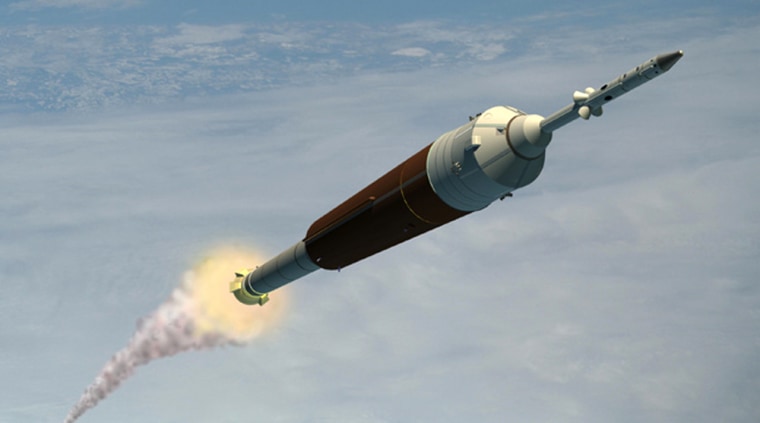NASA officials said Wednesday it might be possible to try out its new moonship a year earlier than its current target date of 2015.
That would mean just a four-year gap between the last space shuttle flight and the debut of the next-generation spacecraft, instead of five years. Many in Congress, including the two presidential candidates, are troubled by the prospect of the United States having to rely on Russia for trips to the international space station during that time.
NASA is midway through a study looking at ways to move up its March 2015 test launch of the new Orion-Ares spacecraft with a crew, in case the next president wants that. The new rocket would ultimately return the United States to the moon, but the initial flights would be to the space station.
It will be difficult to accelerate the mission by much more than a year, however, said Jeff Hanley, manager of NASA's back-to-the-moon program, called Constellation.
"We're shooting for a more aggressive date of September 2014," and looking at even faster options, he said. "The real stretch is what can we do to accelerate as much as 18 months. That will be particularly hard."
The two-month study, which includes outside experts, should be completed in early December.
NASA's Ares rocket would have an Apollo-style capsule on top, called Orion, to carry astronauts. A moon flight is targeted for 2020.
The Ares concept has been controversial from the start; some engineers, in fact, have been working in their off-hours on alternative rocket designs.
If NASA were to drastically redesign the rocket at this point as some have suggested, it would push everything back three years, said Steve Cook, the Ares project manager at Marshall Space Flight Center in Huntsville, Ala.
"Everybody's entitled to an opinion," Cook told reporters in a conference call. "But I think you've got to stick to the facts of engineering and project management, and the fact that we're three years into this. You'd basically back yourself up three years and start over again, so just watch the gap grow."
NASA has been struggling with ways to make the new rocket safer and has come up with possible solutions for controlling its vibrations to prevent injuring the crew, and preventing the rocket from drifting into the launch tower at liftoff. Cook said the latter problem is remote — a southerly wind would have to be blowing 39 mph (62 kilometers per hour) or more — and could be controlled through the steering system or with tight wind constraints.
Space shuttle commander Brent Jett, director of flight crew operations, said he's sought dissenting opinions from his fellow astronauts, but no one is willing to scrap the Ares rocket.
NASA hopes to perform a test flight of an unmanned Ares rocket next July. But that could be delayed by the space shuttle repair mission to the Hubble Space Telescope.
